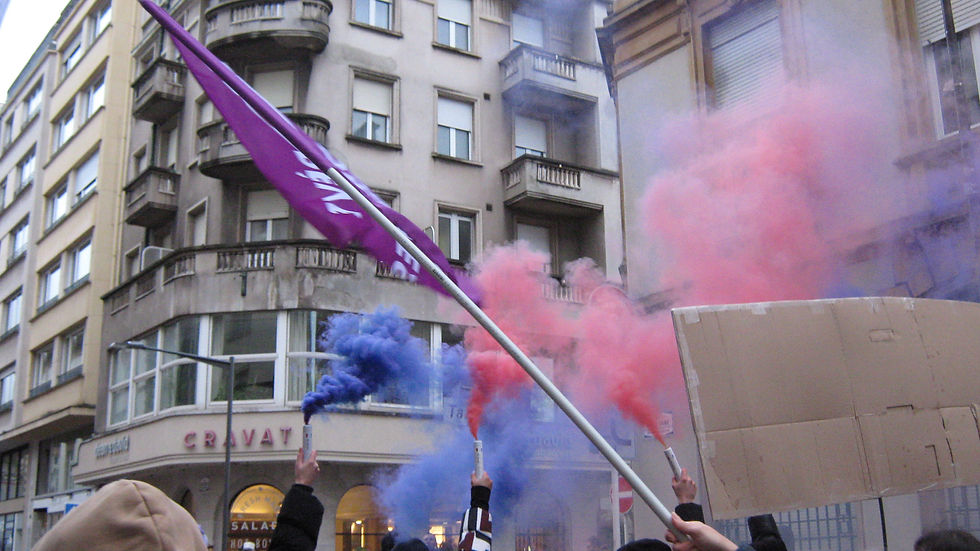Why you should be an Intersectional Feminist
- Jessica Lentz
- Mar 6
- 4 min read
Picture this.
You’re on your phone and you open Instagram.
You start scrolling.
Your finger slides past an avalanche of dystopian content, a patchwork of distressing information:
humanitarian crises,
the rise of fascism, genocide,
gender-based violence, mass deportation, climate breakdown.
The stripping of the rights of the most marginalized among us.
You lock your phone again and feel discouraged. Exhausted, even.
A familiar scenario for many of us.
We live in a time of heightened polarization, of so-called ‘culture wars’ and the rising popularity of alt-right rhetoric on a global scale. In these conditions, it can be hard to feel hopeful about the future of the world.
It is hard to know what to do with your feelings, let alone what actions to take in this flood of crushing news. Where to even begin?
The first step, I argue, is to recognize that all of these issues – the struggle against fascism, the struggle for human (women’s, migrants’, workers’, queer people’s, BIPOC’s) rights, the struggle for a just and equitable world – are interconnected.
As visionary writer and Black feminist Audre Lorde put it: “We do not have single issue struggles, because we don’t live single issue lives.”
This is what “intersectional feminism” is about. American Law professor Kimberlé Crenshaw, who coined the term in 1989, describes it as “a prism for seeing the way in which various forms of inequality often operate together and exacerbate each other.”

In other words, intersectional feminism acknowledges that humans operate on an entire spectrum of differences – such as gender, race and sexuality, to name a few – which produce experiences of varying degrees of discrimination and privilege for different people.
What intersectional feminism asks us, then, is to acknowledge that we are not the same. There is a whole range of different struggles people go through. But these struggles are all inextricably, inevitably, viscerally interconnected – as are we as humans.
Once you start seeing the world through the prism of intersectional feminism, this will in turn completely change the way in which you see injustice manifest itself in the world. The different crises on your Instagram feed will suddenly not appear as separate, but rather as different parts of the same bigger picture, where one crisis intertwines with/produces the next.
Intersectional feminism asks us to recognize how the struggle against fascism and the struggle for a free Palestine go hand in hand. It asks us to see how a child being exploited by a fast-fashion supplier is an infringement of children’s rights everywhere. It asks us to be outraged at the expansion of oil and gas fields anywhere, since they harm the health of planet Earth as a whole.
At this point, you might think: “OK, that’s all good and well, but where does that leave me? How can I start to tackle this mountain of injustice in the world?”
The sobering answer is: you, as an individual, can’t. At least not alone.
But the good thing is, you don’t have to. You don’t have to hold the weight of the entire world, but you – we all – need to start somewhere.

In a hyper-individualistic world, we need each other, now perhaps more than ever. Lean into communities around you – your friends and family – but I also encourage you to be curious and look for other communities beyond that to get politically engaged (be it collectives, unions, associations, political parties). Engagement for the betterment of the world can take on many different forms.
Intersectional feminism tells us that we are not the same – in fact, we are all situated somewhere on an entire spectrum of difference. But this does not mean that we shouldn’t fight for one another.
I’ve barely scratched the surface of it all, but I hope to have piqued your interest. Below, you will find a list of readings and content to consume if you’re interested in intersectional feminism or other pressing political issues of our time.
To end my article, I want to leave you with another quote by Lorde:
“You must not have to be me in order for us to fight alongside each other. […] What we must do is to commit ourselves to some future that can include each other and to work towards that future with the particular strengths of our individual identities. And in order to do this, we must allow each other our differences at the same time as we recognize our sameness”.

Further Readings and Films:
African Queens, directed by Ethosheia Hylton and Tina Gharavi.
Davis Y, Angela. Freedom is a Constant Struggle: Ferguson, Palestine, and the Foundations of a Movement.
Davis Y, Angela. Women, Race and Class.
Hickel, Jason. Less is More: How Degrowth will Change the World.
Kimmerer, Wall Robin. Braiding Sweetgrass: Indigenous Wisdom, Scientific Knowledge, and the Teaching of Plants.
Le Bihan, Aurore. Comprendre le féminisme intersectionnel en 4 étapes, https://chiche.makesense.org/media/feminisme/comprendre-le-feminisme-intersectionnel-en-4-etapes.
Loach, Mikaela. It’s Not that Radical: Climate Action to Transform our World.
Lorde, Audre. The Master’s Tools will Never Dismantle the Master’s House.
Sources:
Lorde, Audre. The Master’s Tools will Never Dismantle the Master’s House. Penguin Books,
2018.






Comments